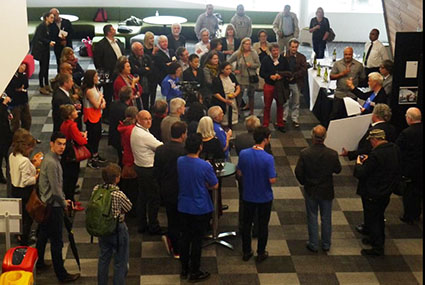
Paul Kendon and Tom Carnegie
AUCKLAND (Pacific Scoop/Pacific Media Watch): Two Australian media academics have called for placing student journalists with community groups to “create relationships” before writing articles.
Speaking at the Pacific Journalism Review conference at AUT University yesterday, their message continued a trend of offering delegates a wide range of research topics, including place, space and culture journalism.
Other topics included an emerging Team Australia concept, West Papua journalism freedom and trauma reporting.
Dr Chris Thomson and Dr Bonita Mason from Curtin University in Western Australia shared presentation duties highlighting the importance of placing student journalists with indigenous community groups.
“Developing a sense of place is imperative for teaching better indigenous affairs reporting,” said Dr Mason.
The traditional custodians of the Western Australian state capital of Perth, the Noongar people, have struggled to find a media voice.
Much of Perth’s mainstream indigenous affairs journalism reproduced “colonial discourse and perpetuates racist stereotypes of Aboriginal people”, she said.
Cultural conversations
Doctoral candidate Khairiah A. Rahman had to leave suddenly for a family bereavement in Malaysia this week, but her husband, Dr Adam Brown, gave his wife’s presentation on cultural conversations in an Islamic context.
Dr Brown explained how the Islamic culture valued two types of credibility.
The first was institutional credibility, such as the religious Imam or the Muftis – Islamic scholars who interpret and expound Islamic law.
The second communication attribute Muslims valued was personal, based on the characteristics of the person speaking, or communicating.
Was the person speaking reliable, trustworthy or known by their actions to be honourable?
Doctoral candidate Arjun Rajkhowa led a discussion in relation to Tony Abbott’s recent Team Australia comments.
What is Team Australia? Team Australia has become almost a parody of itself being compared to South Park creators' film Team America.
Pugilist prowess
Rajkhowa said the term “Team Australia” was a very masculine term which would appeal to Abbott’s sporting prowess as pugilist and triathlete.
The Prime Minister’s statement “that everyone has got to be on Team Australia” was mystifying, Rajkhowa said.
What did Abbott mean? Was he referring to Australia, the country? The people or the global positioning of Australia?
Participants at the conference were left with more questions than answers.
New Zealand human rights advocate Maire Leadbeater presented a comparative study of Auckland press coverage of West Papua in the 1960s compared compared with the present.
Her research found that the coverage of West Papua issues was given considerably more coverage in the 1960s, in terms of the number of stories published and in the detail of information.
Leadbeater said she believed the coverage was better in the 1960s as news agencies had more autonomy and there was a perception that Pacific issues were closer to New Zealand geographically and culturally.
Death coverage
AUT journalism senior lecturer Lyn Barnes and honours student Elesha Edmonds gave a discussion on the changing death coverage of The New Zealand Herald.
Their research focused on the coverage of death on the front page of the Herald over four decades.
It was found that death had become a prominent feature on the front page with the “threat of death” and “near death” becoming increasing news staples.
The authors discussed how the increase in death coverage was a result of a shift from fact-based stories to narrative-themed stories.
This work is licensed under a Creative Commons Attribution-NonCommercial 3.0 New Zealand Licence.




